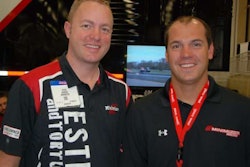Researchers are going to study the effects of allowing truck drivers to divide their sleeper berth times into shorter periods, and will be looking for 200 truckers to participate in their work.
Virginia Tech University, along with subcontractors from Washington State University and SmartDrive, recently won a $2.5 million contract from the Federal Motor Carrier Safety Administration (FMCSA) to study a flexible hours-of-service safety provision that would allow drivers to split their required sleeper berth time into shorter periods.
VaTech’s David Mellicamp drives a truck along a Smart Road in Blacksburg, Va.Drivers are currently required by federal regulations to log at least 10 consecutive off-duty hours before returning to on-duty status.
“For some time now, sleeper berth drivers have called for flexibility with the hours-of-service requirements, and this study will provide the scientific foundation for FMCSA to understand what the safety benefits and impacts may be in allowing such flexibility,” said Rich Hanowski, director of the Center for Truck and Bus Safety at the Virginia Tech Transportation Institute and principal investigator for the study. “This pilot project will produce scientific data necessary to further inform FMCSA about this important safety issue that potentially affects the well-being of everyone traveling on our nation’s roads.”
Researchers will recruit at least 200 ruck drivers who regularly use their sleeper berths, including drivers from large, medium, and small carriers; owner-operators; and team drivers. Using onboard video monitoring systems provided by SmartDrive, researchers will collect data about driver behavior. Information about drivers’ sleep patterns will also be collected using an activity monitor worn on the driver’s wrist. The study will measure roadside violations, crashes and driver sleepiness.
“This study will examine the safety impact of providing participating drivers the opportunity to use a ‘sleep when you are sleepy’ strategy to manage their individual fatigue,” said Kimberly Honn, a post-doctoral researcher from Washington State University. “They will still be required to comply with the overall federal hours-of-service safety requirements, but during the study they will be allowed to exercise a degree of flexibility in logging sleeper berth time.”
“Keeping drivers and the motoring public safe is the top priority for our industry,” said Steve Mitgang, chief executive officer of SmartDrive. “The onboard video monitoring system is uniquely capable of providing the insights required to understand the impact of flexible sleep schedules on driving. SmartDrive is proud that our advanced video analytics platform, proven over millions of driving miles, has been selected to support this important study.”
Carriers that wish to find out more about the study are asked email Rebecca Hammond at [email protected]










